#Child Labour
Text
I sometimes wonder what the IP situation for Homestuck actually looks like. Like, yes, on paper Andrew Hussie sold the rights to Homestuck outright to Viz Media in 2017, but what did he actually sell? What did they actually buy? Hussie famously made extensive use of uncompensated fan-labour in large parts of the comic's production, including labour performed pseudonymously and/or labour provided by minors, and definitely there's a conversation to be had about the ethical dimension of that – you can genuinely make an argument that Homestuck was built on the back of child labour law violations, which I bet isn't a sentence you were expecting to read today! – but I have to imagine it's also rendered the comic's IP situation a hopeless mess.
5K notes
·
View notes
Text
i've just seen this tiktok where this guy's stripping a victorian era tile roof & each of the tiles have a child's hand print on the back of them, some of them are so clear you can make out the lines on their palms 🥹


#rj speaks#he shows about eight tiles in the video & each of them have a little hand print </3#tiktok#child labour#is this grief?
934 notes
·
View notes
Photo

Child labour rate
by geo.ranking
95 notes
·
View notes
Text
Quebec Labour Minister Jean Boulet has amended his law project, Bill 19, regulating youth employment in the province to allow children under 14 to work in agriculture, provided the business has a maximum of 10 employees.
The proposed law, tabled in March, would limit the number of weekly hours Quebecers 16 and under can work during the school year to 17. It also sets the minimum legal working age at 14 — with some exceptions for jobs like babysitting or tutoring.
But Boulet's amendment would allow small agricultural businesses to be exempt from the new minimum working age and employ children as young as twelve.
[...]
This new exemption echoes the demands of employers, who asked for more exceptions to allow children under 14 to work.
But there are concerns over the agricultural environment being risky as injuries in young people are frequent. Some doubt the ability of Quebec's labour regulator, La Commission des normes, de l'équité, de la santé et de la sécurité du travail (CNESST), to ensure the safety of children in the workplace.
Full article
Tagging: @allthecanadianpolitics
#cdnpoli#canada#canadian news#canadian politics#québec#quebec#child labour#workers rights#children's rights#labour#agriculture#agricultural industry#jean boulet#bill 19#workplace safety#mine#what the fuck man#la commission des normes de l'équité de la santé et de la sécurité du travail#CNESST#child labour laws
192 notes
·
View notes
Text
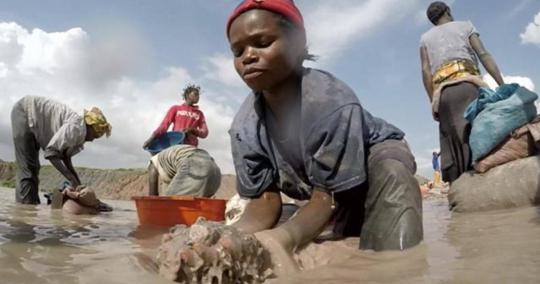
Children still mining cobalt for gadget batteries in Congo
A CBS News investigation of child labor in cobalt mines in the Democratic Republic of Congo has revealed that tens of thousands of children are growing up without a childhood today – two years after a damning Amnesty report about human rights abuses in the cobalt trade was published. The Amnesty report first revealed that cobalt mined by children was ending up in products from prominent tech companies including Apple, Microsoft, Tesla and Samsung.
There's such sensitivity around cobalt mining in the DRC that a CBS News team traveling there recently was stopped every few hundred feet while moving along dirt roads and seeing children digging for cobalt. From as young as 4 years old, children can pick cobalt out of a pile, and even those too young to work spend much of the day breathing in toxic fumes.
What's life like for kids mining cobalt for our gadgets?
So, what exactly is cobalt, and what are the health risks for those who work in the DRC's cobalt mining industry?
What is cobalt?
Cobalt – a naturally occurring element – is a critical component in lithium-ion, rechargeable batteries. In recent years, the growing global market for portable electronic devices and rechargeable batteries has fueled demand for its extraction, Amnesty said in its 2016 report. In fact, many top electronic and electric vehicle companies need cobalt to help power their products.
The element is found in other products as well.
"Cobalt-containing products include corrosion and heat-resistant alloys, hard metal (cobalt-tungsten-carbide alloy), magnets, grinding and cutting tools, pigments, paints, colored glass, surgical implants, catalysts, batteries, and cobalt-coated metal (from electroplating)," says the U.S. Centers for Disease Control and Prevention.
More than half of the world's supply of cobalt comes from the DRC, and 20 percent of that is mined by hand, according to Darton Commodities Ltd., a London-based research company that specializes in cobalt.
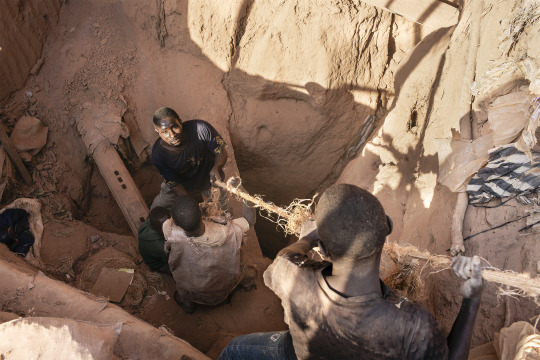
Health risks of chronic exposure
According to the CDC, "chronic exposure to cobalt-containing hard metal (dust or fume) can result in a serious lung disease called 'hard metal lung disease'" – a kind of pneumoconiosis, meaning a lung disease caused by inhaling dust particles. Inhalation of cobalt particles can cause respiratory sensitization, asthma, decreased pulmonary function and shortness of breath, the CDC says.
The health agency says skin contact is also a significant health concern "because dermal exposures to hard metal and cobalt salts can result in significant systemic uptake."
"Sustained exposures can cause skin sensitization, which may result in eruptions of contact dermatitis," a red, itchy skin rash, the CDC says.
Despite the health risks, researchers with Amnesty International found that most cobalt miners in Congo lack basic protective equipment like face masks, work clothing and gloves. Many of the miners the organization spoke with for its 2016 report – 90 people in total who work, or worked, in the mines – complained of frequent coughing or lung problems. Cobalt mining's dangerous impact on workers and the environment
Some women complained about the physical nature of the work, with one describing hauling 110-pound sacks of cobalt ore. "We all have problems with our lungs, and pain all over our bodies," the woman said, according to Amnesty.
Moreover, miners said unsupported mining tunnels frequently give way, and that accidents are common.
Miners know their work is dangerous, Todd C. Frankel wrote late last month in The Washington Post.
"But what's less understood are the environmental health risks posed by the extensive mining," he reported. "Southern Congo holds not only vast deposits of cobalt and copper but also uranium. Scientists have recorded alarming radioactivity levels in some mining regions. Mining waste often pollutes rivers and drinking water. The dust from the pulverized rock is known to cause breathing problems. The mining industry's toxic fallout is only now being studied by researchers, mostly in Lubumbashi, the country's mining capital."
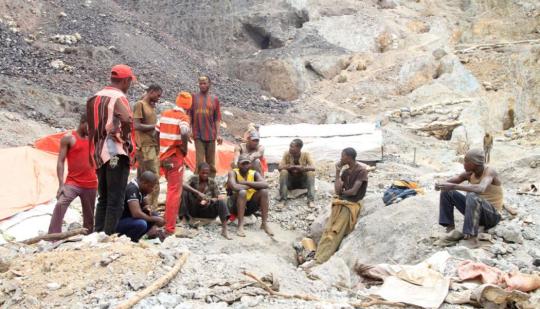
"These job are really desired"
Despite the dangers and risks of working as miners in the cobalt industry, at least of the some miners in the Congo "love their jobs," according to Frankel.
"When I talked to the miners there, none of them want to lose their jobs or give up their jobs. They love their jobs," Frankel said Tuesday, speaking on CBSN. "In a country like Congo, mining is one of the few decently paying jobs to be had there, and so they want to hold onto these jobs."
They also want fair treatment, decent pay, and some safety, "and they would love for their kids to not work in the mines," he said.
"It's a poverty problem," Frankel said. "These parents I talked to – they don't want their kids working in these mines. The problem is that their school fees – schools cost money, and you know, food costs money, and they sort of need their kids to work in there."
Poverty also drives children into the mines instead of school – an estimated 40,000 of them work in brutal conditions starting at very young ages.
The thousands of miners who work in tunnels searching for cobalt in the country "do it because they live in one of the poorest countries in the world, and cobalt is valuable," Frankel wrote in the Washington Post article.
"Not doing enough"
CBS News spoke with some of the companies that use cobalt in their lithium-ion batteries. All of the companies acknowledged problems with the supply chain, but said they require suppliers to follow responsible sourcing guidelines. Apple, an industry leader in the fight for responsible sourcing, said walking away from the DRC "would do nothing to improve conditions for the people or the environment."
Read company responses here
Amnesty said in November, however, that "major electronics and electric vehicle companies are still not doing enough to stop human rights abuses entering their cobalt supply chains."
"As demand for rechargeable batteries grows, companies have a responsibility to prove that they are not profiting from the misery of miners working in terrible conditions in the DRC," the organization said. "The energy solutions of the future must not be built on human rights abuses."
An estimated two-thirds of children in the region of the DRC that CBS News visited recently are not in school. They're working in mines instead.
CBS News' Debora Patta spoke with an 11-year-old boy, Ziki Swaze, who has no idea how to read or write but is an expert in washing cobalt. Every evening, he returns home with a dollar or two to provide for his family.
"I have to go and work there," he told Patta, "because my grandma has a bad leg and she can't."
He said he dreams of going to school, but has always had to work instead.
"I feel very bad because I can see my friends going to school, and I am struggling," he said.
Amnesty says "it is widely recognized internationally that the involvement of children in mining constitutes one of the worst forms of child labour, which governments are required to prohibit and eliminate."
#cobalt#PD Congo#PDR Congo#cobalt mining by children#amnesty university#The toll of the cobalt mining industry on health and the environment#Congo Economic Theft#minerals#rare earth minerals#tesla#iphones#cellphone batteries#ev batteries#lithium batteries#child labour#forced child labor#poverty#systemic racism
47 notes
·
View notes
Text
i love trigun aus where it’s just like. what if the gung ho guns all worked in the same mundane location. the office. mcdonalds. a fucking cafe. regardless of career ww only shows up to smoke for 8 hours and make knives + legato lose 10 years of life from pure stress
#dorian writes#dorian’s au time#gung ho guns#trigun#trigun stampede#tristamp#trimax#trigun maximum#i just need them at mcdonalds now#how is zazzie involve you ask?#child labour#vine boom sound effect#midvalley bringing the sax to work#as background music to their chaos#im asking for The Office! Trigun au#please
65 notes
·
View notes
Text

The dark-haired girl on the right with the impish smile, her name was Eddie Lou, she was about 8 years old when this photo was taken in 1909. The picture was taken at the Tifton Cotton Mill, Tifton, Georgia. The girls worked there.
The photograph was taken by Lewis Hine, who visited factories such as this mill and took photographs of the children who worked there as evidence for the National Child Labor Committee (NCLC).
In another part of the country, Mary Harris Jones, also known as "Mother Jones", led a march of children from Philadelphia to New York in what would be known as the March of the Mill Children, a three-week trek by striking child and adult textile workers on July 7, 1903.
Children had been forced to work in coal mines and mills, when their fathers were killed or injured, unable to support the families. As a result, many children suffered stunted growth and were injured, maimed. Mother Jones described the children, "some with their hands off, some with the thumb missing, some with their fingers off at the knuckle. They were stooped things, round shouldered and skinny. Many of them were not over ten years of age, the state law prohibited their working before they were twelve years of age."
“Since 2000, for nearly two decades, the world had been making steady progress in reducing child labour,” according to the United Nations. “But over the past few years, conflicts, crises and the COVID-19 pandemic, have plunged more families into poverty – and forced millions more children into child labour. Economic growth has not been sufficient, nor inclusive enough, to relieve the pressure that too many families and communities feel and that makes them resort to child labour. Today, 160 million children are still engaged in child labour. That is almost one in ten children worldwide.”
This is an update of a series of stories that have been posted for Labor Day. You can find those stories in the Peace Page archive or Google the information on your own to find out more.
~~~~~
“Over 100 years ago, the National Child Labor Committee used photos of children doing industrial work to demand change in America. Several states adopted child labor laws, and after much debate and several setbacks, the Fair Labor Standards Act became law in 1938. Its protections included the nation’s foundational child labor laws, including restrictions on the age of workers and hours they can toil,” wrote Michael Lazzeri, regional administrator of the U.S. Department of Labor’s Wage and Hour Division in Chicago
Max McCoy of the the Kansas Reflector wrote today on September 3, 2023:
“After more than a century of progress, you might think child labor is a thing of the past, something we condemn other countries for but that we don’t need to worry about here. Tragically, that shadow army of workers is still with us, and many of those workers are children. These underage exploited are often immigrants . . .”
“In February of this year, a cleaning company was fined $1.5 million for employing children ages 13 to 17 at meatpacking plants in eight states. The firm, Packers Sanitations Services Inc., was the target of a federal Department of Labor investigation that found 102 children working illegally, including 26 at the Cargill meatpacking plant at Dodge City.
“Appallingly, many states are now racing to loosen — not tighten — child labor laws.
“Arkansas, for example, in March did away with the requirement that the state’s Division of Labor had to give permission or verify the age of children under 16 to be employed. Although those under 14 still cannot be employed, the ending of age verification requirements is an invitation to child labor abuses.
“Other states are making similar moves.
“Iowa, for example, has made it legal for teenagers to work in meatpacking plants and children as young as 16 to bartend. New Jersey and New Hampshire have also lowered ages for some types of work. The argument goes that work builds character and that overly restrictive laws prevent young people from fully developing their capacity to earn a living.
“But such arguments stink like the stuff you find on a slaughterhouse floor.”
~~~~~
"In the early 1900s, Hine traveled across the United States to photograph preteen boys descending into dangerous mines, shoeless 7-year-olds selling newspapers on the street and 4-year-olds toiling on tobacco farms. Though the country had unions to protect laborers at that time — and Labor Day, a federal holiday to honor them — child labor was widespread and widely accepted. The Bureau of Labor Statistics estimates that around the turn of the century, at least 18 percent of children between the ages of 10 and 15 were employed," according to the Washington Post.
Mother Jones would say after the march, "I held up their mutilated hands and showed them to the crowd and made the statement that Philadelphia's mansions were built on the broken bones, the quivering hearts and drooping heads of these children. That their little lives went out to make wealth for others. That neither state or city officials paid any attention to these wrongs. That they did not care that these children were to be the future citizens of the nation."
Many industries hid the fact that they employed children. They took advantage of poor families, such as Eddie Lou's family. Eddie Lou's father had died and left her mother with 11 children and no income. Her mother was forced to work at the cotton mill for $4.50 a week. Eddie Lou and four siblings also worked there and they were all together paid $4.50 as well. Eddie Lou and her youngest siblings would eventually be sent to an orphanage because her mother wasn't able to provide for them.
“If we don’t hold the line on child labor, we risk losing one of the things the has sets us apart as a nation founded not only on laws, but of morals,” wrote McCoy. “Of course children provide cheap labor, but business profits should not be the gauge of our society. In addition to the mental and physical tolls that children suffer in jobs that are inappropriate — and can you really imagine a 16-year-old wiping down the bar and asking what’s your poison? — there’s also a danger these children will become primary breadwinners for their families, with their educations coming a distant second.”
The children at the march carried banners that said, "We want more schools and less hospitals" and "We want time to play."
~ jsr
The Jon S. Randal Peace Page
30 notes
·
View notes
Link
The Quebec government wants to limit the presence of children in the workforce and will table a bill as early as February to do so. The labour minister says he hopes the bill will be adopted by June, just in time for schoolchildren's 2023 summer break.
[...]
She said she was prompted to start asking questions at the National Assembly and pushing for child labour regulations in May, after Radio-Canada reported that an 11-year-old girl had been using a deep fryer at her job.
Boulet's announcement follows a report from Quebec's advisory committee on labour and workforce (CCTM).
Boulet said there are details left to refine before the bill will be ready for the National Assembly.
The CCTM, a grouping of unions and employer associations, unanimously recommended the minimum age for employment be set at 14 — with a few exceptions.
Children 13 and under would be allowed to work only in specific settings like babysitting, fruit-picking, family businesses and recreational activities.
Continue Reading.
Tagging: @politicsofcanada
98 notes
·
View notes
Text
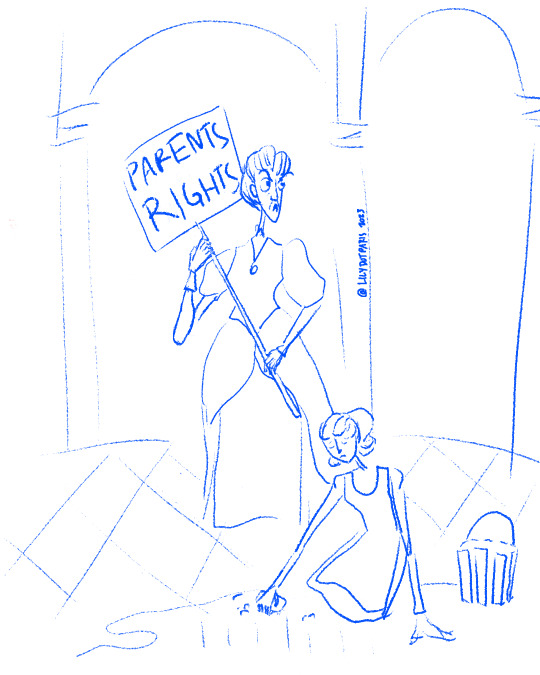
#political comic#parents rights#childrens rights#trans rights#trans youth#transphobia#evangelism#far right#conservatism#republican#lgbtq#child abuse#child labour#Cinderella#comic#cartoon#illustration#gag panel#art
12 notes
·
View notes
Text
5 notes
·
View notes
Text

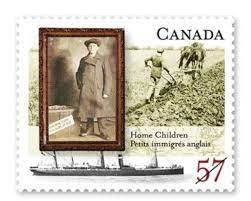
The Year of the British Home Child was honoured by Canada Post
#British Home Children#orphans#foundlings#postage stamp#farming#child labour#rural Canada#immigrants#harvesting#field work#Royal Mail#Commonwealth#Canada Post#UK
17 notes
·
View notes
Text
Child miners: the dark side of the DRC’s coltan wealth - ISS Africa
Coltan is one of the world’s most vital minerals, and 60% of reserves globally are found in the Democratic Republic of the Congo’s (DRC) Kivu province. In 2019, 40% of the global coltan supply was produced in the DRC.
The mineral is used in cell phones, laptops and other devices because of its particular ability to store and release electrical energy. As 5G technology grows, the demand for Congolese coltan will increase. But this is not good news for everyone in the DRC.
Much of the country’s coltan is extracted using the labour of over 40 000 child and teenage miners. Coming from remote villages and towns in Kivu, they either drop out of school or have never had the opportunity to attend. The informality of the extractive sector provides attractive job opportunities for vulnerable children, who serve as a pool of cheap labour.
9 notes
·
View notes
Text
youtube
Hey guys, here's yet another reason to be as vocal as possible telling Biden he's not gonna have our vote next year.
Remember trump putting kids in cages at the border?
Well, Biden is not only still doing that, he's also helping sign in laws that legalize child labour, which specifically is targeting immigrant children to be used for labour.
"Vote blue no matter who!!!" Crowd screaming and crying an entire year before the election about how we need to all vote for Biden are literally just telling Biden and everyone else that it doesn't matter how monsterous their actions are (Hello, *literally supporting and funding a genocide!), they don't need to change to get our vote, they just need to pretend they're better than their opposition.
Well "vote blue no matter who" crowd who's screaming and crying about how we need to get Biden re-elected, since you apparently don't care when he's funding a genocide, here's something to think about:
He has not enshrined abortion rights at the federal level
He has not enshrined trans and other queer protection/anti discrimination laws at the federal level
He has not raised the federal minimum wage
He has not stopped putting kids in cages
He is actively funding and backing laws that exploit children for labour in gruesome, dangerous conditions.
He is trying to pass laws that would allow the white house to send military aid and funds to allies without ANY congressional oversight and allow the sending of these funds and weapons to be kept secret from the public (hint hint: it's to keep the genocide of Palestinians going so the USA can continue to use israel as a military base in the middle east)
and more!
Now, please tell me, what, exactly, do you hope to accomplish, telling this man a FULL YEAR before the election, that he's got our vote no matter what he does? Do you seriously think that is going to accomplish anything? Did you seriously forget that Biden and trump are not the only politicians on the face of the earth that can run for president???
Telling Biden that he's got your vote no matter how many people he kills, no matter how many children he exploits, is literally just motivation for him to run for president again and continue to be in office, where he can continue to commit genocide and sabotage everything he was 'supposed' to uphold and protect with his super powers of ~being better than a republican~
Biden is not the only presidential candidate. You need to be screaming from the rooftops and the streets that these fucking monsters are never going to get another vote in their life if they continue to uphold these fucking crimes against humanity.
Not coddling them and crying about how we have to vote for these monsters otherwise [things literally happening right now under a democrats reign will happen under a republican!!!!].
#child exploitation#human trafficking#child labour#'vote blue no matter who! Biden'll stop putting kids in cages!!!'-- you sure about that?#genociden biden#biden#joe biden#2024 election#Youtube
6 notes
·
View notes
Text





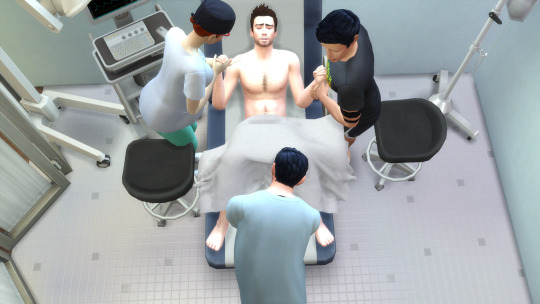



Derek wanted to deliver their third child, with Lydia assisting & Scott for moral support.
Pose Credit.
#sterek au#sterk#sims 4#stiles stilinski#derek hale#sterek mpreg#mpreg#stiles mpreg#sterek#teen wolf#stiles#child birth#child labour
68 notes
·
View notes
Text
student wage is code for underpaid child labour
115 notes
·
View notes
Text

You WILL get back in the fucking goldmines and you WILL be happy about it you little shit
45 notes
·
View notes